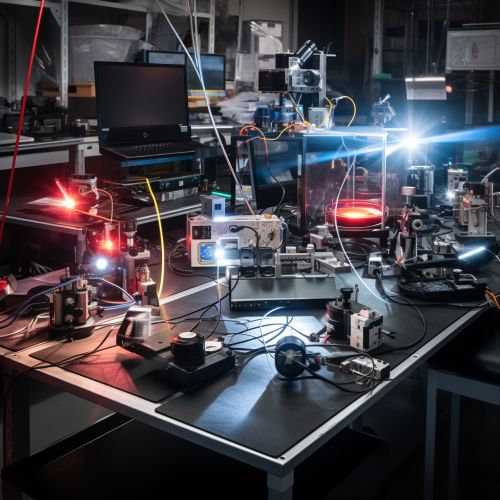Quantum Computing with Quantum Optics and Quantum Photonics
Introduction
Quantum computing is a rapidly evolving field that leverages the principles of quantum mechanics to perform computational tasks. Quantum optics and quantum photonics are two key areas that contribute significantly to the development and implementation of quantum computing systems. This article delves into the concepts, principles, and applications of quantum computing with a focus on quantum optics and quantum photonics.
Quantum Computing
Quantum computing is a type of computation that utilizes quantum bits, or qubits, instead of the classical bits used in traditional computing. Qubits can exist in a superposition of states, allowing them to process a vast amount of information simultaneously. This property, along with entanglement and quantum interference, gives quantum computers a computational advantage over classical computers for certain tasks.
Quantum Optics
Quantum optics is a branch of quantum physics that focuses on the behavior of light and its interactions with matter at the quantum level. It involves the study of individual photons and their properties, such as polarization, phase, and amplitude. Quantum optics plays a crucial role in quantum computing as it provides the theoretical framework for the manipulation and control of quantum states of light, which are used as qubits in some quantum computing architectures.


Quantum Photonics
Quantum photonics is a field that combines quantum mechanics and photonics to manipulate, generate, and detect photons at the quantum level. Quantum photonics has numerous applications in quantum computing, quantum communication, and quantum sensing. In the context of quantum computing, quantum photonics enables the development of photonic quantum computers that use photons as qubits.
Quantum Computing with Quantum Optics
Quantum optics provides the basis for several quantum computing models, such as linear optical quantum computing (LOQC) and cavity quantum electrodynamics (cQED). These models leverage the properties of photons and their interactions with matter to perform quantum computations.
Linear Optical Quantum Computing
Linear optical quantum computing (LOQC) is a model of quantum computing that uses photons as qubits and linear optical elements, such as beam splitters and phase shifters, to manipulate these qubits. LOQC exploits the principles of quantum interference and quantum superposition to perform quantum computations.
Cavity Quantum Electrodynamics
Cavity quantum electrodynamics (cQED) is another model of quantum computing that utilizes the principles of quantum optics. In cQED, qubits are represented by atoms trapped in optical cavities, and quantum computations are performed by manipulating these atoms using light.
Quantum Computing with Quantum Photonics
Quantum photonics enables the development of photonic quantum computers, which use photons as qubits. Photonic quantum computers have several advantages, including the ability to operate at room temperature and the potential for high-speed quantum computations due to the speed of light.
Photonic Quantum Computing
Photonic quantum computing uses the principles of quantum photonics to perform quantum computations. In this model, quantum information is encoded in the quantum states of photons, and quantum gates are implemented using linear optical elements and photon detectors.
Applications
Quantum computing with quantum optics and quantum photonics has a wide range of applications, including cryptography, optimization, simulation, and machine learning.
Quantum Cryptography
Quantum cryptography leverages the principles of quantum mechanics to secure communication. Quantum key distribution (QKD), a popular application of quantum cryptography, uses the properties of quantum optics and quantum photonics to generate and distribute cryptographic keys securely.
Quantum Simulation
Quantum computers can simulate quantum systems more efficiently than classical computers. Quantum optics and quantum photonics provide the theoretical and experimental tools needed for the development of quantum simulators.
Quantum Machine Learning
Quantum machine learning is an emerging field that combines quantum computing and machine learning. Quantum computers, including those based on quantum optics and quantum photonics, have the potential to speed up machine learning algorithms.
Conclusion
Quantum computing with quantum optics and quantum photonics is a promising field with the potential to revolutionize computation. The principles and techniques of quantum optics and quantum photonics provide the foundation for the development of powerful quantum computers and have numerous applications in cryptography, simulation, and machine learning.
